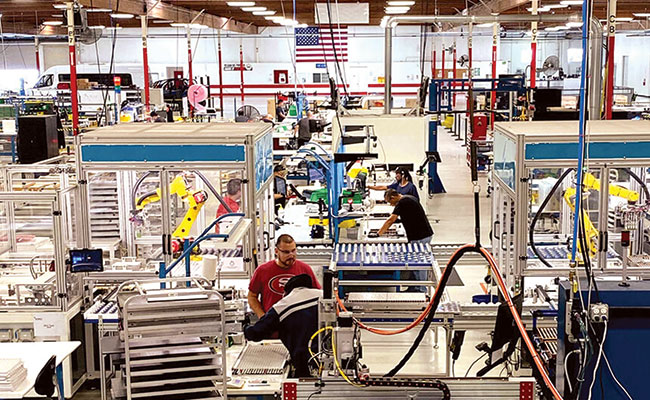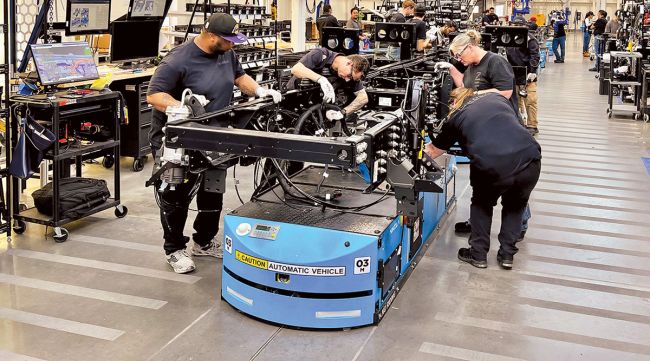The first deliveries of Nikola’s hydrogen-fuel-cell-powered Class 8 truck are set to begin as early as late September, CEO Steve Girsky said Sept. 13.
Production of the Tre fuel cell electric vehicle began July 31 at Nikola’s Coolidge, Ariz.-based manufacturing plant after a retooling that started in May.
The Coolidge facility is running at a rate that would produce 2,400 hydrogen-powered trucks a year, he said.
Girsky, who took over as chief executive on Aug. 4 from Michael Lohscheller, said during a fireside chat hosted by Nikola that the first trucks off the production line are undergoing final testing before being delivered.

Girsky
One of the trucks undergoing testing ran more than 900 miles in a day recently, he said, adding: “I defy anyone to find another zero-emission vehicle truck anywhere that can run up to 900 miles in a day.”
“There’s a lot of white space between Nikola and the competition in the zero-emission Class 8 truck market,” he said, comparing the head start the company has on legacy original equipment manufacturers and fellow disrupters to that of Tesla in the passenger electric vehicle space a decade or more ago when Girsky was working for General Motors.
To date, the company has 210 FCEV orders. During the company’s second-quarter 2023 earnings call Aug. 7, Chief Financial Officer Stasy Pasterick said Nikola expects to deliver a combined 300-400 FCEV and battery-electric trucks in 2023.
Today, Nikola President and CEO, Steve Girsky, engaged in a candid and informative chat and Q&A session to share valuable insights into the company’s strategic direction and current developments as it relates to four key topics based on the shareholder questions received. The… pic.twitter.com/r9ay7UYkWz
— Nikola Motor Company (@nikolamotor) September 13, 2023
Sales and deliveries of Class 8 Tre BETs are suspended after a series of battery fires, including on June 23, Aug. 10 and Sept. 8. A total of 209 trucks have been recalled, the company said Aug. 11.
The issue behind the recall is confined to battery packs manufactured by Nikola’s one-time subsidiary, Romeo Power, Girsky said Sept. 13. Nikola acquired Romeo in August 2022 for $144 million. In July, Nikola began liquidating Romeo’s assets.
Class 4-6 truck manufacturer Mullen Automotive on Sept. 11 bought Romeo’s battery production assets for $3.5 million.

The production floor of Romeo Power’s manufacturing plant. The issue behind the recall is confined to battery packs manufactured by Romeo, a former Nikola subsidiary. (Romeo Power)
Nikola’s BETs are being returned to the Coolidge plant to fix a coolant leak inside the battery pack. The coolant leak involves the coolant manifold and related coolant lines, Girsky said, expanding understanding of what the issue was beyond details released Aug. 11.
Each BET has nine battery packs, and each battery pack has two coolant loops, said the company’s top executive, adding that Nikola will replace coolant lines that connect to the manifolds as part of the repairs.
“Once the pack is open, [Nikola] will inspect all the modules to ensure integrity. Module components and potentially the entire module may need be replaced on a case-by-case basis if any additional issues are discovered,” Girsky said, adding that the company is working to source the parts required.
The timeline and cost of the process following the recall is still uncertain, Girsky said.

Gragg Wilson of UPS won grand champion honors at the National Truck Driving Championships. Wilson takes us through the competition’s course, successful driving practices and how to attract new drivers. Tune in above or by going to RoadSigns.ttnews.com.
Nikola stopped serial production of the BET in May ahead of the Coolidge retooling and start of FCEV production in July. The Tre BET will now only be available on a “build-to-order” basis.
Phoenix-based Nikola hemorrhaged money in 2022, with cash burn averaging $200 million. Refocusing on just producing the FCEV is part of the executive team’s plans to improve finances. Nikola was losing money on each BET it sold.
Another strand to the plans to slash costs was cutting 270 jobs and winding up the company’s European operations. Nikola expects the layoffs to trim $50 million from its annual cash outflows.
Nikola returned to the short-term debt markets in July to bolster its funds as FCEV production ramped up. The company raised $124.5 million in August through the sale of convertible notes that will mature in 2026.
Until August, Nikola was struggling to find a way to improve its liquidity. But on July 17, Delaware Gov. John Carney approved an amendment to Section 242 of the Delaware General Corporation Law.
Under the change, the threshold for amending a company’s certificate of incorporation to increase its authorized share total would switch from a majority of the outstanding common stock to a majority of the shares voting on the proposal.
Nikola adjourned its annual meeting twice, unable to meet the threshold, before the amendment became effective Aug. 1. Upon reaching maturity, convertible debt issuance becomes equity.
Some of the funds will aid the ramping up of Nikola’s Hyla hydrogen refueling business. Nikola has revamped Hyla since its launch in January, including selling off the Phoenix Hydrogen Hub production project to Fortescue Future Industries in July.
In 2023, a total of nine mobile hydrogen fueling trucks will be deployed, Girsky said. The company’s hydrogen fueling infrastructure build-out may be its biggest opportunity, he said. Initially, hydrogen refueling trucks will be deployed along Interstate 5 and Interstate 10.






